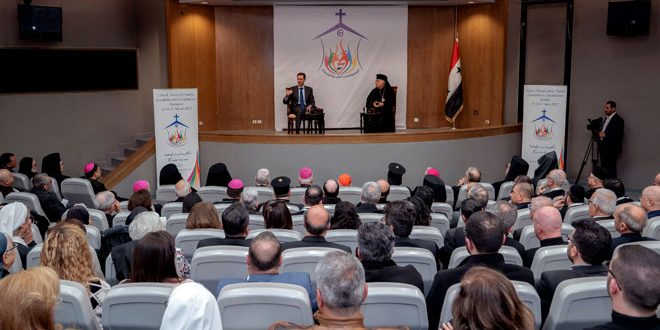On Saturday, the head of the Syrian regime, Bashar al-Assad, met with representatives of humanitarian, social, and developmental associations and institutions participating in the recent international ecclesiastical conference.
“The Christian citizen in Syria is not a guest, nor a passing citizen, but a partner, and the title of this partnership is work and production,” Assad said in his speech with participants, the official Syrian News Agency (SANA) reported on Sunday.
He added that “the displacement of Christians is a primary goal of the external plans of the region, but it is primarily an Israeli goal, because when the countries of the region are divided into different sectarian states, each one having a color, then Israel becomes part of the natural fabric. Therefore, preserving the region’s fabric and its diverse identity is a necessity. We must defend it.”
The three-day international ecclesiastical conference held in Damascus under the theme “Church is a house of love” with Arab and international participation concluded on Thursday.
Read also: International Conference of Religions & Beliefs of Mesopotamia in Qamishli
The Syrian regime is promoted as the protector of minorities in Syria in light of the rise of Islamic jihadist organizations.
The number of Christians in Syria was 2.2 million at the time of the 2011 revolution but fell to 677,000 in 2021, according to the World Christian Persecution Index published by the NGO Open Doors.
A segment of Christians, including most of the leaders of Syrian churches, support the Syrian regime because their political and economic interests are intertwined with it. Others support it as a guarantee for the security of Christians in Syria, according to a study entitled “Christians and the Revolution in Syria” issued by the Malcolm Kerr-Carnegie Middle East Center in April 2016.
But on the other hand, many young Christians participated in peaceful demonstrations during the first months of the revolution and engaged in various initiatives aimed at informing society of the demands of the revolution and mobilizing support for it.
The Ministry of Social Affairs and Labor in Syria maintains information about registered civil associations, including Islamic ones, and this information, despite its limitations, is confidential, meaning that civil work in Syria is considered a state secret that may not be disclosed, which necessarily reflects on the performance of Islamic associations and their funding resources. This is according to an indicative paper of INTRAC entitled Syria’s NGO Sector – Overview.”
Remarks by the Observer: Recently, the Druze clergy has backed protests in Suweida against government policies.
This article was translated and edited by The Syrian Observer. The Syrian Observer has not verified the content of this story. Responsibility for the information and views set out in this article lies entirely with the author.


